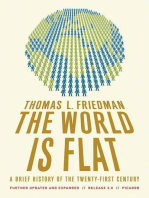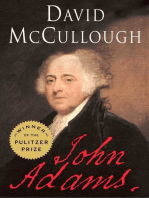Religion in A Good Man Is Hard To Find
Religion in A Good Man Is Hard To Find
Uploaded by
Sydney CouchCopyright:
Available Formats
Religion in A Good Man Is Hard To Find
Religion in A Good Man Is Hard To Find
Uploaded by
Sydney CouchOriginal Title
Copyright
Available Formats
Share this document
Did you find this document useful?
Is this content inappropriate?
Copyright:
Available Formats
Religion in A Good Man Is Hard To Find
Religion in A Good Man Is Hard To Find
Uploaded by
Sydney CouchCopyright:
Available Formats
Bloom's Literature
religion in A Good Man Is Hard to Find
As is typical of Flannery O'Connor's fiction, her short story "A Good Man is Hard to Find" is a commentary on the
universal need for the grace and hope of Jesus Christ, as the author introduces characters that are extremely ungracious
and situations that are completely devoid of hope. Through a fatal, personal encounter with the character of the Misfit, a
mass murderer of whom the grandmother warns from the very beginning of the narrative, O'Connor engages with the
Christian gospel in a very direct manner. Having built up the theme of human goodness throughout the text, goodness is
radically challenged and redefined in the story's conclusion.
During her dialogue with the Misfit while her family is taken away and brutally killed one after the other, the grandmother
appeals to the killer's sense of goodness, which she associates with not being from a "common" family, but also with
goodness of heart and the fact that she herself is "a lady" and therefore cannot be killed by a good person. O'Connor,
however, is concerned with an entirely different kind of goodness, one that the grandmother does not even begin to
understand until it completely overwhelms her in the face of death, and that the Misfit shies away from, as he recognizes
it as being life-consuming—the goodness of Christ.
When the grandmother calls for her son Bailey, unaware that he has just been murdered, the Misfit informs her that "Jesus
was the only One that ever raised the dead … and He shouldn't have done it. He thrown everything off balance. If He did
what He said, then it's nothing for you to do but throw away everything and follow Him, and if He didn't, then it's nothing
for you to do but enjoy the few minutes you got left the best way you can—by killing somebody or burning down his
house or doing some other meanness to him." Apart from Christ, proclaims the Misfit, goodness does not make any sense;
he dares to face and point out the logical consequences of atheism. If there is no meaning in life, no higher standard of
right and wrong, no absolute truth, there is no reason not to be a murderer. Through the Misfit, O'Connor presents the
consequences of a life that truly does not acknowledge God and puts the self at the center of human existence.
Having proclaimed that he is simply not sure of Christ's existence, although he would like to have witnessed his ministry
just to be certain, the Misfit lives his godless life to the fullest. In that sense, he is the only sincere character in the story,
acknowledging that true Christianity cannot be halfhearted. Prior to encountering the Misfit, the grandmother's faith is
without fruit; her life is not shaped by Christian values, as the reader can see as the story follows her conversations and
inner convictions. She is not consumed by Christ in the way that the Misfit knows a true follower would be. In fact, the
grandmother is most willing to compromise Christ's power when she sees this as a chance to save her life, claiming that
perhaps he did not raise the dead after all. Ironically, at the very moment at which the grandmother is transformed and
experiences the life-altering grace of Christ, embracing the murderer of her family as her son, the Misfit shoots her
because he cannot handle the affection she directs at him, and because he does not desire grace in his life.
"A Good Man Is Hard to Find" is a story about goodness in humans, which, as O'Connor shows, is nonexistent apart from
Christ. When the Misfit proclaims in the end that the grandmother "would of been a good woman … if it had been
somebody there to shoot her every minute of her life," he ultimately points to Christ's death on the cross, an outside force
that made the grandmother change. Through the character of the Misfit, who so freely admits his own guilt in light of
Christ's innocence, O'Connor points to a universal need for grace. She puts words of wisdom into his mouth as he
proclaims that if Jesus is indeed who he says he is, the only proper human response is worship and abandonment of the
self. If Jesus does not exist, human evil is justified, as it remains without eternal consequences.
Copyright © 2023 Infobase Learning. All Rights Reserved.
You might also like
- The Subtle Art of Not Giving a F*ck: A Counterintuitive Approach to Living a Good LifeFrom EverandThe Subtle Art of Not Giving a F*ck: A Counterintuitive Approach to Living a Good LifeRating: 4 out of 5 stars4/5 (5945)
- The Gifts of Imperfection: Let Go of Who You Think You're Supposed to Be and Embrace Who You AreFrom EverandThe Gifts of Imperfection: Let Go of Who You Think You're Supposed to Be and Embrace Who You AreRating: 4 out of 5 stars4/5 (1109)
- Never Split the Difference: Negotiating As If Your Life Depended On ItFrom EverandNever Split the Difference: Negotiating As If Your Life Depended On ItRating: 4.5 out of 5 stars4.5/5 (888)
- Hidden Figures: The American Dream and the Untold Story of the Black Women Mathematicians Who Helped Win the Space RaceFrom EverandHidden Figures: The American Dream and the Untold Story of the Black Women Mathematicians Who Helped Win the Space RaceRating: 4 out of 5 stars4/5 (926)
- Grit: The Power of Passion and PerseveranceFrom EverandGrit: The Power of Passion and PerseveranceRating: 4 out of 5 stars4/5 (598)
- Shoe Dog: A Memoir by the Creator of NikeFrom EverandShoe Dog: A Memoir by the Creator of NikeRating: 4.5 out of 5 stars4.5/5 (545)
- The Hard Thing About Hard Things: Building a Business When There Are No Easy AnswersFrom EverandThe Hard Thing About Hard Things: Building a Business When There Are No Easy AnswersRating: 4.5 out of 5 stars4.5/5 (354)
- Elon Musk: Tesla, SpaceX, and the Quest for a Fantastic FutureFrom EverandElon Musk: Tesla, SpaceX, and the Quest for a Fantastic FutureRating: 4.5 out of 5 stars4.5/5 (476)
- Her Body and Other Parties: StoriesFrom EverandHer Body and Other Parties: StoriesRating: 4 out of 5 stars4/5 (831)
- The Emperor of All Maladies: A Biography of CancerFrom EverandThe Emperor of All Maladies: A Biography of CancerRating: 4.5 out of 5 stars4.5/5 (274)
- The Little Book of Hygge: Danish Secrets to Happy LivingFrom EverandThe Little Book of Hygge: Danish Secrets to Happy LivingRating: 3.5 out of 5 stars3.5/5 (419)
- The World Is Flat 3.0: A Brief History of the Twenty-first CenturyFrom EverandThe World Is Flat 3.0: A Brief History of the Twenty-first CenturyRating: 3.5 out of 5 stars3.5/5 (2272)
- The Yellow House: A Memoir (2019 National Book Award Winner)From EverandThe Yellow House: A Memoir (2019 National Book Award Winner)Rating: 4 out of 5 stars4/5 (99)
- Devil in the Grove: Thurgood Marshall, the Groveland Boys, and the Dawn of a New AmericaFrom EverandDevil in the Grove: Thurgood Marshall, the Groveland Boys, and the Dawn of a New AmericaRating: 4.5 out of 5 stars4.5/5 (270)
- The Sympathizer: A Novel (Pulitzer Prize for Fiction)From EverandThe Sympathizer: A Novel (Pulitzer Prize for Fiction)Rating: 4.5 out of 5 stars4.5/5 (122)
- Team of Rivals: The Political Genius of Abraham LincolnFrom EverandTeam of Rivals: The Political Genius of Abraham LincolnRating: 4.5 out of 5 stars4.5/5 (235)
- A Heartbreaking Work Of Staggering Genius: A Memoir Based on a True StoryFrom EverandA Heartbreaking Work Of Staggering Genius: A Memoir Based on a True StoryRating: 3.5 out of 5 stars3.5/5 (232)
- On Fire: The (Burning) Case for a Green New DealFrom EverandOn Fire: The (Burning) Case for a Green New DealRating: 4 out of 5 stars4/5 (75)
- The Unwinding: An Inner History of the New AmericaFrom EverandThe Unwinding: An Inner History of the New AmericaRating: 4 out of 5 stars4/5 (45)
- Character and Conflict Sample Paper - Barbie Q With Outside SourceDocument3 pagesCharacter and Conflict Sample Paper - Barbie Q With Outside SourceSydney CouchNo ratings yet
- Intro To Poetry UpdateDocument65 pagesIntro To Poetry UpdateSydney CouchNo ratings yet
- Blog #1Document2 pagesBlog #1Sydney CouchNo ratings yet
- Civil Liberties Part 2 CTCDocument5 pagesCivil Liberties Part 2 CTCSydney CouchNo ratings yet
- UNITED STATES GOVERNMENT Van 1Document10 pagesUNITED STATES GOVERNMENT Van 1Sydney CouchNo ratings yet













































